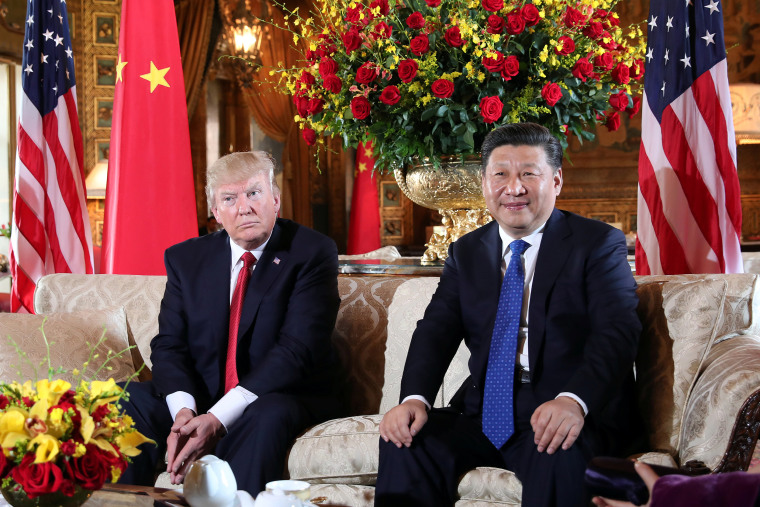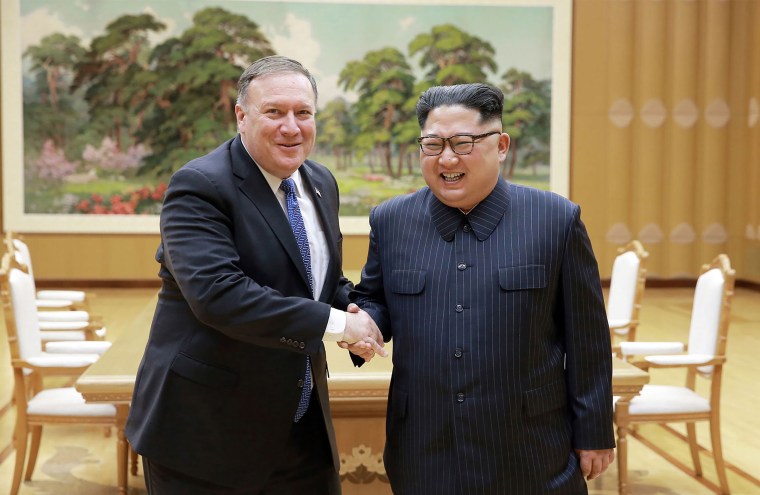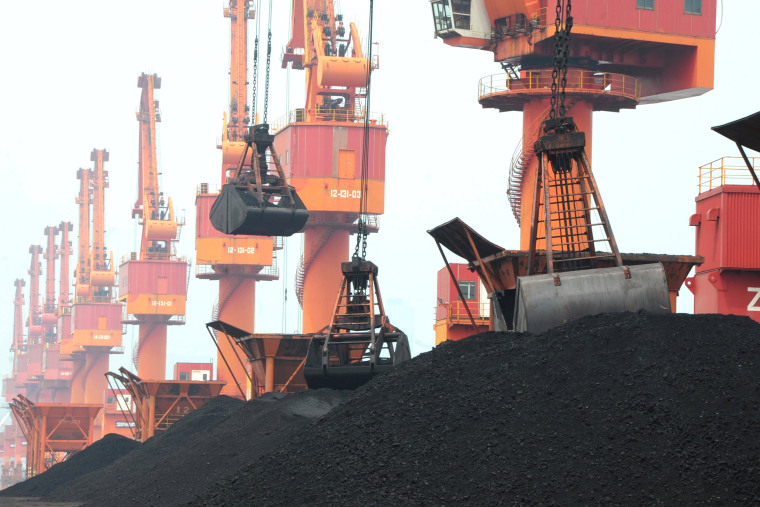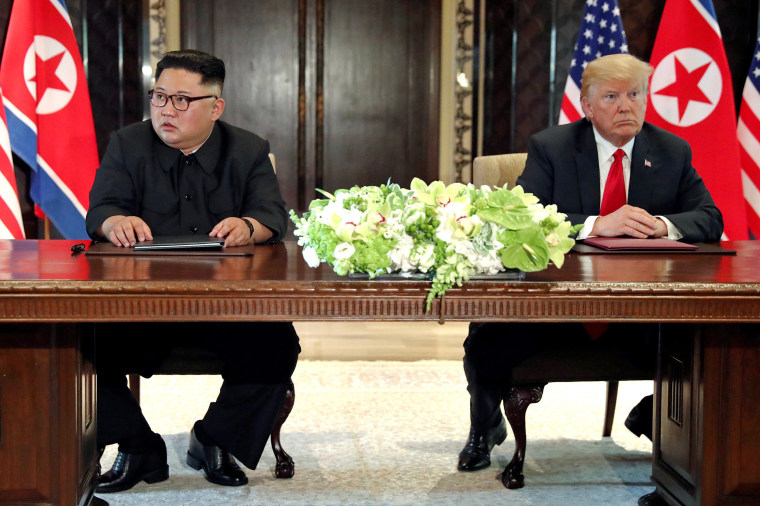WASHINGTON — China has steadily loosened restrictions on trade with North Korea in recent months, undercutting President Donald Trump's effort to exert economic pressure on Kim Jong Un's regime, former U.S. officials and independent experts told NBC News.
From coal shipments to revived construction projects to planes ferrying Chinese tourists to Pyongyang, China has reopened the door to both legal and illegal trade with the North, throwing the North Korean government a vital lifeline while derailing U.S. diplomacy. North Korea depends almost entirely on its larger neighbor to keep its economy afloat.
The increase in trade can be traced back to March, when the White House stunned Beijing by announcing plans for Trump to hold an unprecedented meeting with the North Korean dictator. Fearing a loss of influence with its often recalcitrant ally, China invited Kim to three successive summits in China, in March, May and June.
While China rolled out the red carpet for Kim, Beijing's enforcement of U.N. sanctions began to soften and its limits on legal commerce also eased, according to regional analysts who track cross-border trade, foreign diplomats and former U.S. officials. As a result, the White House's bid to impose "maximum pressure" on North Korea, in hopes of pushing the regime to abandon its nuclear and missile program, has been dealt a severe blow.

"The Trump administration's much vaunted maximum pressure is now at best minimal pressure," said Daniel Russel, a former senior State Department official who oversaw China policy. "And that means a huge loss of leverage."
Trump's rush to meet with Kim — before U.S. and North Korean officials had time to hammer out a clear agenda or commitments from Pyongyang — doomed a relatively united international front against the North that had been painstakingly assembled, Russel and other former officials said.
Now it could be almost impossible to reconstitute the pressure campaign. Apart from China's reluctance, South Korea's progressive President Moon Jae-in is openly promoting economic engagement with the North and does not share Washington's preference for strangling the regime's trade prospects.
The shift is evident at the Chinese port of Longkou, where North Korean cargo ships have been spotted pulling into coal docks, according to data obtained by NBC News from Windward, a firm that uses commercial satellites and other data to track maritime traffic. Ten North Korean cargo vessels visited the coal docks in May and June. Prior to that no North Korean ships had paid a visit to the port since January.
Traffic has picked up on the border bridge to the Chinese city of Dandong, a main artery for North Korea. Small trucks carrying coal have been photographed moving across the border bridge, according to NK Pro, a specialist website that focuses exclusively on North Korea.
Coal is a crucial source of revenue for Pyongyang and U.N. sanctions bar North Korea from shipping coal to China or elsewhere.
There are other signs of an economic thaw.
Gasoline prices in North Korea, which had soared as China squeezed fuel supplies last year, have steadily dropped since March. The Trump administration has blasted North Korea for skirting sanctions by obtaining oil at sea, conducting at least 89 ship-to-ship transfers of fuel.
The unofficial exchange rate for the euro in North Korea also shot up in the winter of this year as sanctions began to bite, but the rate came back down by June and July, NK Pro reported. The rate rose to 10,000 North Korean won to one euro in February, and has now returned to about 8,000:1.

North Korea also appears to be defying U.N. sanctions adopted in December 2017 that prohibit it from selling fishing rights in its waters. Starting in May, maritime data has shown an increase in foreign fishing vessels in North Korea's exclusive economic zone, Lucas Kuo, an analyst at C4ADS, told NBC News.
Construction activity has resumed in the North Korean capital, analysts said, and workers and heavy machinery have returned to a joint bridge project between the Chinese town of Tumen and the North Korean town of Namyang. The site had gone quiet last year and into the first quarter of 2018, experts at NK Pro reported.
Chinese tourism, which is not banned under U.N. sanctions and has provided a valuable source of hard currency, had dramatically dropped off as Beijing scaled back passenger flights and suspended most travel tours. But tourism has surged since June, after Air China resumed full service to North Korea and Beijing authorities lifted restrictions on travel tours, experts said.
Passenger flights to the capital are regularly sold out and expanded train service must be booked at least two weeks in advance due to the high demand. The rise in visitors has caused delays for some tour groups at Chinese customs offices at the border and the North Koreans have struggled to mobilize tour guides to accommodate the thousands of tourists coming by train and plane, according to NK Pro and other analysts. North Korea has even opened a tourist office in Taiwan.

"Those tourists are a serious money-maker for North Korea, and also an important political signal," said Russel, now at the Asia Society Policy Institute. "It's a signal to anybody who has business interests with North Korea that there's plenty of room to maneuver now."
Trump, who once boasted his talks with Kim had eliminated the regime's nuclear threat, complained last month that China was "not helping" with North Korea. His secretary of state, Mike Pompeo, and U.N. ambassador, Nikki Haley, have called on other countries to crack down on sanctions-busting, citing smuggling by sea and overland borders.
"When sanctions are not enforced, the prospects for successful denuclearization are diminished," Pompeo said in July.
But the administration has mostly steered clear of publicly condemning China, defended its diplomacy with Pyongyang as successful so far and played down the idea that the sanctions regime is unraveling.
"We have not seen significant changes in the strength with which the international community is enforcing sanctions on North Korea," a U.S. intelligence official, who spoke on condition of anonymity, told NBC News. "Trade may go up, but the enforcement of sanctions, that remains."
The Trump administration declined to comment on the record.
Dismayed by North Korea's barrage of missile and nuclear tests, China last year backed the U.S.-led effort to impose "maximum pressure" on Pyongyang. The Chinese supported the sanctions partly out of concern over Trump's threats of military action, the so-called "bloody nose" option. But those threats have receded amid a potential detente with Pyongyang. Meanwhile, the U.S. president has since launched a trade war with China, with both governments imposing tariffs on a vast array of goods amid threats to impose more.
Despite Trump's olive branch to Kim, North Korea has taken no concrete steps to fulfill Washington's demands to provide a full inventory of its nuclear arsenal, permit a verification of its capabilities or agree to a timeline to dismantle its weapons. But Kim secured the suspension of a U.S. military exercise, the relaxation of sanctions enforcement by China, reduced the likelihood of a preemptive U.S. military strike and forged a dialogue with South Korea for possible economic cooperation.
Victor Cha, a former senior diplomat who was at the negotiating table more than a decade ago the last time the United States tried to persuade North Korea to give up its nuclear weapons, said Kim has come out ahead after his summit with Trump.
The North Koreans "are getting everything they want right now," said Cha, currently a professor at Georgetown University.
The regime has bought itself more time to advance its missile and nuclear technology, he said. "The status quo is great for them."
CORRECTION (Sept. 7, 2018, 5:20 p.m. ET): A previous version of this article misstated Moon Jae-in's title. He is South Korea's president, not its prime minister.
CORRECTION (Sept. 5, 2018, 5:42 a.m.): An earlier version of this article incorrectly stated the number of North Korean cargo vessels visiting the Chinese port of Longkou. Ten vessels visited the coal docks in May and June, not 29.
